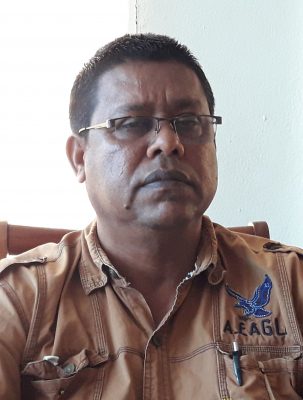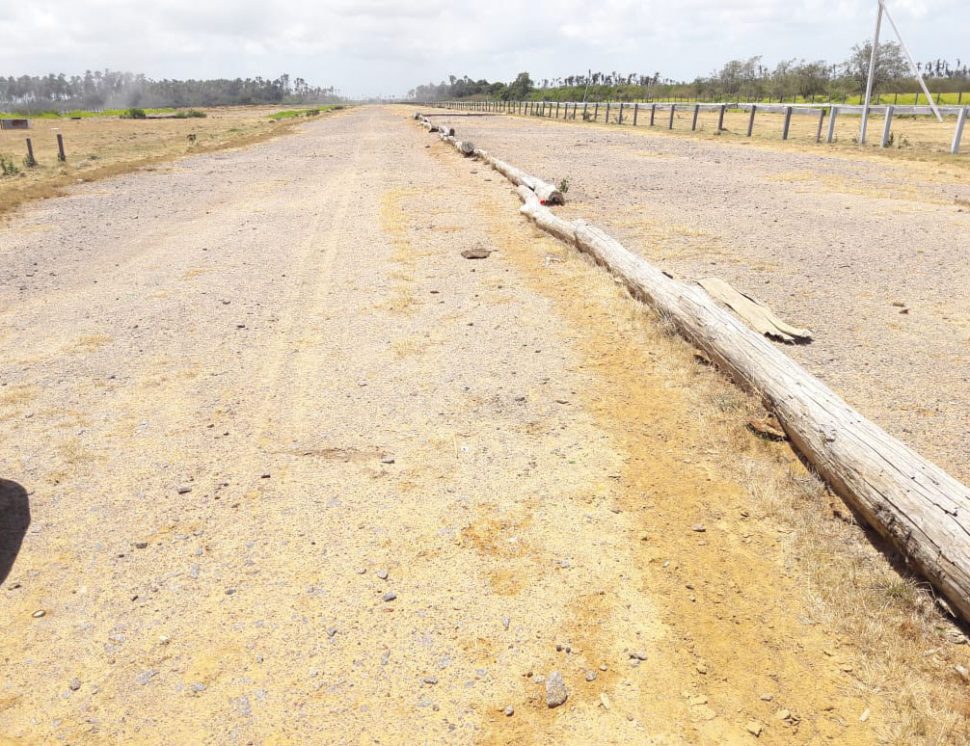Nand Persaud and Company Limited has been awaiting approval to complete an airstrip at Number 36 Village, Corentyne, for three years, according to Chief Executive Officer Mohindra Persaud, who says the project could revolutionise rice farming in the region.
Although Persaud said that the company has been awaiting approval from the Public Infra-structure Ministry, when contacted the ministry’s Public Relations Officer, Krest Cummings, stated that the application is presently at the Defence Board, under the Ministry of Presidency. According to Cummings, the Ministry of Public Infrastructure cannot issue an approval until approval is given from the Ministry of Presidency.
Persaud told Sunday Stabroek that before halting works, the company spent over $25 million on the airstrip. So far, he said, the necessary land filling, compaction and surfacing works have been completed.

He explained that based on what he has been told, the application has been with the Ministry of Public Infrastructure, which had to get necessary information and permission from other agencies before giving the company feedback. “For us, we have to apply to the Ministry of Infrastructure and they have to do the run about,” he said. “After three years, nothing has been done or nothing has been said and nothing has been given to us that you know this is what their [the ministry] position is, that they can’t give us because we have to get this more done, so that we can work and put it in place,” he, however, lamented.
Persaud said farmers are still anxiously awaiting the completion of the airstrip, which is expected to enable aerial spraying and fertilising that they believe will yield better quality paddy. “If a farmer produce quality paddy, the farmer makes profit because quality paddy gives you higher price and gives you higher weight. When the paddy quality goes down, the weight goes down as well, so you don’t lose money on the quality of paddy by the price, you lose more money on the weight of the paddy,” he explained.
Additionally, Persaud stated that over the past five years it has been recognised that paddy bug infestations are becoming harder to manage. “…Because it’s too much work have to do in a short given time and we don’t have the human power to do all that work in a short time and that’s why Nand Persaud invest in an airstrip that when this happens the aircraft can really control it in a big way and where the small fields are available the human power can take care of that and that will give you a crop, insect-free,” he noted.
Further touching on the location of the airstrip, Persaud said, it is an ideal one which is expected to reduce the cost of flying time for farmers.
Persaud also noted that while for a previous crop the GuySuCo airstrips in the region were used by farmers, the cost for access and flying time were extremely high.
Persaud believes that Berbice’s farmers have been shortchanged during the time the project has been in limbo. “Not only in spraying alone in fertilising too. We suffer some consequences because, again, when fertilising start and every farmer want to fertilise, we can’t get the human resource here. There is a shortage of workers,” he added.
He explained that the human labour available will still be used to carry out regular work in the small fields while the aircraft will do the necessary spraying in the larger fields and so employment is not expected to be affected.
According to Persaud, the company’s main interest in overhead spraying and fertilising is to ensure that farming becomes more profitable. “We know the reason why a farmer will not be profitable. Farmers not profitable when they have problems with insect outbreaks and flooding. These are the times they really have a problem, and insects damage been from inception but the patterns are getting every season more serious,” he explained.
Meanwhile, as the company awaits approval for the airstrip, Persaud noted that it is also presently continuing the construction of a $24 million soil and disease testing lab at the John’s Science Centre in Tain Settlement, Corentyne.
He said in about six weeks, main construction works are expected to be completed after which interior and other works will have to be done.
However, Persaud stressed, this will be extremely beneficial to farmers as well. “If we can get aircraft spraying to do maybe 40% of this region and same thing with fertilising and we get a soil lab [where] farmers test the soil before they start cultivation, we certainly going to get over 60 bags per acre,” he said.
Presently, a majority of farmers are getting about 38 to 42 bags per acre, while some are getting 45 to 50 bags per acre, he said. “Farmers do things on tradition but if we can test the soil and know what is the mixture and we go by that mixture and then we take care of the insects and we throw fertiliser on time with the aircraft, 60 bags going to be our minimum in this region,” he added.









